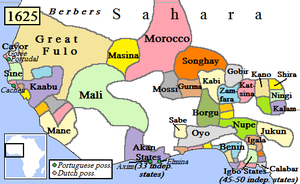
Back Gobernantes tradicionales de Nigeria Spanish Dirigeants traditionnels du Nigeria French Sarakunan Gargajiya na Najeriya Hausa Governanti tradizionali della Nigeria Italian Governantes tradicionais da Nigéria Portuguese

Nigerian traditional rulers often derive their titles from the rulers of independent states or communities that existed before the formation of modern Nigeria. Although they do not have formal political power, in many cases they continue to command respect from their people and have considerable influence in their community.[1]
Though their bearers usually maintain the monarchical styles and titles of their sovereign ancestors, both their independent activities and their relations with the central and regional governments of Nigeria are closer in substance to those of the high nobility of old Europe than to those of actual reigning monarchs.
- ^ Oma Djebah; Collins Edomaruse; Lanre Issa-Onilu; Agaju Madugba; Oke Epia (31 August 2003). "Royal Fathers: Their Power, Influence, Relevance..." BNW News. Retrieved 3 September 2010.
© MMXXIII Rich X Search. We shall prevail. All rights reserved. Rich X Search